Papers by Josefin Wangel
Sustainability, 2020
This article reports on a critical review of how cultural heritage is addressed in two internatio... more This article reports on a critical review of how cultural heritage is addressed in two internationally well-known and used neighborhood assessment tools (NSAs): BREEAM Communities (BREEAM-C) and LEED Neighborhood Design (LEED-ND). The review was done through a discourse analysis in which critical heritage studies, together with a conceptual linking of heritage to sustainability, served as the point of departure. The review showed that while aspects related to heritage are present in both NSAs, heritage is represented as primarily being a matter of safeguarding material expressions of culture, such as buildings and other artifacts, while natural elements and immaterial-related practices are disregarded. Moreover, the NSAs institutionalize heritage as a field of formal knowledge and expert-dominated over the informal knowledge of communities.
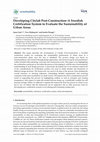
Sustainability, 2020
This paper describes the development of Citylab Post-Construction, a Swedish certification system... more This paper describes the development of Citylab Post-Construction, a Swedish certification system for evaluating the sustainability performance of urban areas in a post-construction phase once the area is inhabited. The process design was based on transdisciplinary and research-through-design approaches, and involved experts and practitioners within Swedish urban planning, real estate and construction sector. This paper is not highlighting the certification system per se, but rather the process of developing it, with the aim of increasing the understanding of such design processes. A previously developed, but so far untested, framework of key considerations for certification systems was used to clarify benefits and drawbacks of different design decisions. The framework was used in all steps of the process, from defining the overall structure, to selecting indicators, formulating detailed requirements and assessing comments of the open consultation of a draft version. The framework of key considerations proved useful in supporting this process, by highlighting conflicts as well as synergies and creating transparency with respect to trade-offs needed between being e.g., scientifically credible but still practical enough. While it is difficult to separate the framework from the process in which it was put to use, we believe that the framework can be supportive also in other processes, both for developing new certification systems or for refining and evaluating existing ones.
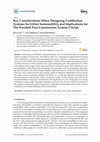
Sustainability, 2019
Addressing sustainability in urban planning has led to an increasing number of certification syst... more Addressing sustainability in urban planning has led to an increasing number of certification systems to support such processes. Nevertheless, there is no commonly recognised framework listing what is important to consider when developing such systems. Citylab is a certification system that is used in several Swedish urban development projects. Today, Citylab certifies the planning process of urban areas but it will be extended with a post-construction part. This paper presents a three steps analysis of the design of such a post-construction certification system. First, a literature review was performed, which allowed for identifying three principles and 11 sub-principles that make up a generic framework for the design of similar certification systems. Second, 13 semi-structured interviews were conducted in Sweden with key urban development stakeholders to better specify the scope of a post-construction extension of Citylab. As a result, four alternatives emerge for the role and function of this system. Third, crossing the results of both previous steps allowed for an understanding of important considerations and implications for the Citylab post-construction certification system design. The paper concludes on the relevance of such a reflexive procedure for the design of certification systems in general, in which the use of the framework is a key to ensure transparency and enable deliberate choices and priorities.

Futures, 2019
There is a lack of futures studies addressing consumption and lifestyles at the level of everyday... more There is a lack of futures studies addressing consumption and lifestyles at the level of everyday life. This article reports on the transformation of the policy-orienting scenario “Legato”, devel- oped by the Swedish Energy Agency in 2016, to a practice-oriented design speculation. The article describes the process of transformation and the resulting energy fiction “Vitiden”. The transformation involved three acts of translation. First, the scope of the transition was explored in-depth, both quantitatively and qualitatively, providing a more detailed understanding of the gap between the ‘sustainable’ 2050 and today. Second, the scenario Legato was analysed for practices and elements of practices that could be elaborated to descriptions of how everyday life could play out in this future. The third step involved re-presenting the practice-oriented scenario as a design speculation. The design speculation was given the form of a book named “Vitiden - an energy fiction” in which the re-formulated version of Legato is presented through text and images, combining a forward-looking manifesto and a backward-looking future archaeology. Besides the written content and the pictures and illustrations of Vitiden, the design of the book is also part of the speculation as it embodies an exploration of how publications, including form, graphic design and choice of materials, could look like in a future such as Legato.
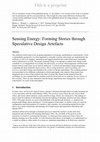
Energy Research and Social Science, 2017
The artificial world is part of an ongoing negotiation of meaning, manifesting in social practice... more The artificial world is part of an ongoing negotiation of meaning, manifesting in social practice. From a sustainability perspective it is thus important to critically examine what norms are imprinted into the artificial, as well as to imagine, materialize and suggest artefacts that could afford more sustainable stories and practices to form. The project Sensing Energy is an attempt to explore how design could contribute to a re-imagination of everyday life and society, as well as what imaginaries (artefacts and related stories) could come out of such an endeavour. A critical and speculative design programme comprising the three leitmotifs Natureculture, Micro-sizing modernity, and Focal things and practices, provided a frame and foundation for a series of design experiments. The resulting artefacts were presented at two different workshops in which participants were asked to form stories that integrated one or more of the artefacts into their everyday life. Based on the material from the workshops we can conclude that the artefacts worked well as parts of, or catalysts, for new stories of the everyday. There are also indications that the design experiments have changed the 'horizon of expectations' for some of the participants.
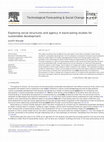
Technological Forecasting and Social Change, 2011
This paper examines how social structures and agency have been included in backcasting studies fo... more This paper examines how social structures and agency have been included in backcasting studies for sustainable development. For this purpose an analytical framework was developed, based on what objects of change (whats), measures (hows) and change agents (whos) are included in the scenario, and to which extent these are approached in an explorative way. Through reviewing a number of backcasting studies it was found that these typically are built upon and elaborated with a predominant focus on the questions of what and how physical/ technical aspects could change. Social objects of change and explicit representation or analysis of the question of who could change is rarely included in the analysis. This unbalance brings a number of implications. Firstly, not including social structures and agency obstructs developing socio-technically consistent and comprehensive scenarios. Secondly, through not addressing the questions of how to change and change by whom in an explicit and explorative way, social structures and agency become represented only implicitly and/or are maintained according to the status quo.

Futures, 2013
ABSTRACT This paper presents a new five-part method for developing goal-based socio-technical sce... more ABSTRACT This paper presents a new five-part method for developing goal-based socio-technical scenarios. In the first part, Scenario ‘Seeds’ are identified or created. The Scenario Content part focuses on the question of what could be changed and by whom, a fundamental element being iterative identification of objects and actors of change. Scenario Outcome focuses on the question of how to assess the potential contribution of these changes, estimated through modelling the scenario in terms of energy usage systems. Scenario Process explores the question of how to develop and represent a scenario in terms of a process of governance. Scenario Content, Outcome and Process are then combined into a Final Scenario which is further assessed and evaluated using qualitative methods. The development of Scenario Content is tested and exemplified in this paper through a scenario study of green mobility in the district of Bromma in Stockholm, Sweden. Preliminary findings indicate that by supporting explicit inclusion of actors and ‘the social’ aspect, the what-who iteration in Scenario Content also helps identify opportunities and obstacles of a social character, thus contributing to creation of socio-technically more consistent and comprehensive scenarios.
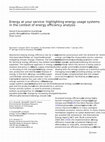
Energy Efficiency, 2011
Increasing energy efficiency has for a long time been identified as an important means of mitigat... more Increasing energy efficiency has for a long time been identified as an important means of mitigating climate change. However, the full potential for technical energy efficiency has seldom been fully exploited. The traditional approach in energy systems analysis and policy is still largely supply-orientated, i.e. focusing on the management of energy conversion, production and distribution, and final use of energy in the form of energy carriers. This paper contributes to previous discussions on how to highlight and explore the user side in the analysis of energy systems in an efficiency context. The energy usage systems approach, including end-use technologies and the production of service demanded by a human activity system, is used to promote a dynamic bottom-up perspective on energy. In determining the possible potential for change by increasing energy efficiency, the demand for energy should not be considered synonymous with the demand for neither energy carriers, nor the measurable service volumes (such as kilometres travelled, square metre conditioned space, etc.), without considering the sociocultural context in which the service is being used or called upon. In summary, the predominant paradigm dealing with the energy system as a technical system managing resources and providing energy carriers should thus be complemented with the view of a socio-technical system facilitating and/or managing the services.
International Journal of Urban Sustainable Development, 2011
This article examines the environmental management of Stockholm&#... more This article examines the environmental management of Stockholm's large brownfield development Hammarby Sjöstad through the concept of negotiating sustainabilities. An Environmental Programme injected exceptional aims into an ongoing, ordinary planning process involving developers, consultants, contractors and other stakeholders. In parallel, a project team was established and given the task of realising aims through governing, networking, negotiation and persuasion. Discourse theory
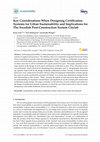
sustainability, 2019
Addressing sustainability in urban planning has led to an increasing number of certification syst... more Addressing sustainability in urban planning has led to an increasing number of certification systems to support such processes. Nevertheless, there is no commonly recognised framework listing what is important to consider when developing such systems. Citylab is a certification system that is used in several Swedish urban development projects. Today, Citylab certifies the planning process of urban areas but it will be extended with a post-construction part. This paper presents a three steps analysis of the design of such a post-construction certification system. First, a literature review was performed, which allowed for identifying three principles and 11 sub-principles that make up a generic framework for the design of similar certification systems. Second, 13 semi-structured interviews were conducted in Sweden with key urban development stakeholders to better specify the scope of a post-construction extension of Citylab. As a result, four alternatives emerge for the role and function of this system. Third, crossing the results of both previous steps allowed for an understanding of important considerations and implications for the Citylab post-construction certification system design. The paper concludes on the relevance of such a reflexive procedure for the design of certification systems in general, in which the use of the framework is a key to ensure transparency and enable deliberate choices and priorities.
Environmental Impact Assessment Review, 2016
Energy Policy, 2013
Cities' climate targets are almost impossible to compare and benchmark. There is a need for consi... more Cities' climate targets are almost impossible to compare and benchmark. There is a need for consistent protocols and frameworks supporting target setting. A framework with key methodological considerations for cities' climate targets is identified. The framework is used to explore the climate targets for eight European cities. The difference between production-and consumption based accounting is illustrated in a new way.
Environmental Modelling & Software, 2014
ABSTRACT This article explores the opportunities of using ICT as an enabling technology to reduce... more ABSTRACT This article explores the opportunities of using ICT as an enabling technology to reduce energy use in cities. An analytical framework is developed in which a typology of ICT opportunities is combined with a typology of household functions, i.e. all the activities that require energy. The energy used for household functions is calculated using a consumption-based lifecycle perspective. The analytical framework is intended to be of use to researchers, city and regional authorities and ICT companies interested in acquiring a better understanding of how ICT investments could contribute to reduce energy use in cities.
Conferences by Josefin Wangel
DRS 2018, 2018
We need to transition our society in a more sustainable direction, for example through enormous c... more We need to transition our society in a more sustainable direction, for example through enormous cut-downs in carbon emissions. Yet this future is hard to envision and work towards. In this project we have, with a transition design posture, designed tools that we believe can be useful to initiate dialogues and reflections on the future. In particular we are interested in using the bridging between provocative and affirmative design as a way to explore and articulate what people see as the lost and found of such a transition. In this paper, we present a study where we used a practice lens to address one possible low carbon future through a provocation workshop. We present our methodology, the tentative tools we used during the workshop and the experiences as expressed by the workshop participants.
This paper discusses how future studies and design could enable a more conscious and participator... more This paper discusses how future studies and design could enable a more conscious and participatory engagement in our common future. The starting point being that representations of the future are often done in an abstract and quantitative manner, which hinders a broad engagement, and understanding of the implications of the scenarios presented. We discuss how on-going research including experimental design methodologies can be used to make images of the future more concrete and accessible. Finally, we argue, not only for prototyping as a method to make the ungraspable future more concrete, but foremost for a designerly approach to the most important of all stakes - the future.
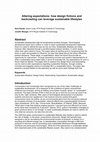
DRS 2014, 2014
Sustainable development calls for fundamental societal changes. Technological development alone w... more Sustainable development calls for fundamental societal changes. Technological development alone won’t suffice; in order to reach sustainable development objectives there is a need to rethink the way we live our lives. Sustainable lifestyles are today however often depicted through a sacrifice-based cultural narrative, in which losses, rather than gains stand in focus. The paper takes its starting point in recognizing that the future is open and possible to influence, but also that (ideas about) the future influences present decisions. These ideas, or expectations, about the future thus provide an opportunity for intervention. Through presenting concrete and positive representations of what a sustainable future might imply in terms of everyday life, the expectations for such a future might be altered. This paper aims to explore how design fiction and backcasting can be used to alter expectations regarding sustainable lifestyles, through creating concrete and engaging visions of everyday life in a sustainable future. The paper also presents a project based on this approach as well as some early findings from this.
Policy and design are fundamentally about the futureabout changing the course of individuals and ... more Policy and design are fundamentally about the futureabout changing the course of individuals and communities, setting patterns for new actions and, in the case of sustainable development, steering toward preferred futures. This paper sets out to explore the theoretical and methodological basis for creating, understanding and representing sustainable futures in terms of altered practices of consumption, through the integration of futures studies, design epistemology and social practice theory. As an introduction to this exploration, we present these three perspectives and generate questions for discussion and future work.
Scenario methods are used and taught in a variety of courses related to sustainable development b... more Scenario methods are used and taught in a variety of courses related to sustainable development by teachers at KTHthe Royal Institute of Technology in Stockholm, Sweden. In this article we explore how scenario approaches, understood in a wide sense, can contribute to education for sustainable development. Based on our experiences from these courses, we identify positive outcomes as well as some key challenges. The four courses presented and discussed in the paper include 3 rd through 5 th year courses from engineering programmes in urban planning, media technology, and industrial design.
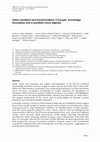
Urban areas and processes are widely acknowledged to be key for enabling sustainability transitio... more Urban areas and processes are widely acknowledged to be key for enabling sustainability transitions at local to global scales, both in the North and in the South. Within the STRN research community, the outstanding importance of cities and urban areas has been recognized increasingly by studies exploring the geography of transitions. While these have inspired a plethora of urban case studies, and highlighted critical topics such as urban experimentation, infrastructure obduracy or "smart cities", the deeper implications of the urban and its particularities for broader societal transitions have remained largely unpacked. In parallel, however, numerous other research fields with an established urban subject focus have equally sought to explore aspects and patterns of contemporary urban change dynamics, often referring to "transition" or "transformation" as their concern, and with some explicitly calling for a new "urban science" and for redesigning the science-policy interface. This involves diverse perspectives (e.g. urban and regional studies, urban ecology, urban governance, urban design, planning, (landscape) architecture, urban sociology, political ecology, urban metabolism), that partly also draw on concepts derived from transition studies. Between all these approaches and their burgeoning volume of empirical material, however, there is still considerable conceptual fragmentation and contradiction, but little comparison, aggregation or joint theoretical development.
Uploads
Papers by Josefin Wangel
Conferences by Josefin Wangel
This is the opening paragraph of "Vitiden - an energy fiction" 1where the transition to a more sustainable society is explored through interacting text and image. In the forward-looking and text-based manifesto, Vitiden is outlined as an answer to today's ecological and social challenges. The high pitch and ambitions of the manifesto are commented on by an image-based future archaeology, constructed by fictional fragments of the future. Inset images from the acceptera manifesto2, which is also paraphrased in the introductory paragraph of Vitiden, relates the energy fiction to the modernist societal development and the critique thereof. A generous body of annotations contributes with further perspectives.